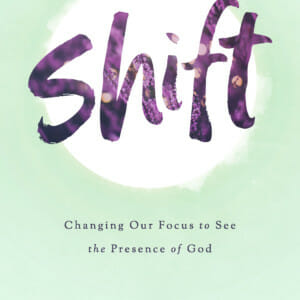The meme popped up in my social media feed and I paused, considering it. It claimed a worship band I sometimes enjoy was part of Satan’s scheme to deceive the church. I thought about the lyrics of some of the popular songs they played on the radio. Most of them contained references to scripture or words from verses. Was I being misled? Should I stop listening to this music altogether?
Several days later, I had a conversation with another believer about physical and spiritual healing. She and her husband were looking for a location for their new church plant and thought they had found a place. However, after conversing with management, they realized that the laying of hands and healing would not be allowed if they leased from this location. Although the reason was unclear, the fear was obvious.
Both situations made me wonder how often we think we’re led by discernment when it’s actually fear leading us. In the Bible, Paul tells us discernment is a spiritual gift and it is valuable to those who exercise it. It keeps the church from falling prey to false doctrine or false prophets and alerts us when God’s word is being taken out of context. But what about the times when instead of discernment, we’re led by our own biases, discomfort, and fear?
The fact that something makes us uncomfortable doesn’t make it untrue. In fact, the Holy Spirit does some of his best work when we’re uncomfortable. When we leave behind what’s familiar and walk with Him into the unknown, this is what faith is.
But times will come when the Spirit is leading us and tells us to run. So how do we know the difference? Are there ways to tell whether we’re being led by fear or discernment? I believe there are if we slow our racing minds enough to pay attention. Here are three ways to tell whether we’re being led by fear or discernment:
1. Fear is often propelled by a lack of understanding, but discernment is an understanding that comes from the Spirit.
When we don’t understand something, one of our natural reactions is to flee. We gravitate toward things that make us feel safe and comfortable. But friends, the Holy Spirit cannot be confined by our comfort zone.
If we look at scripture, the religious group who had the least understanding of who Jesus was tried to keep everyone from following him. They were the Pharisees, and they were led not by true discernment that comes from God but by their own fear. They feared Jesus was going to take power away from them and expose the hollow doctrine they preached. Nearly every interaction they had with Jesus was to manipulate him or trick him into doing something that contradicted scripture.
Matthew tells of one of the many instances where the Pharisees and Sadducees ask Jesus for a sign from heaven, but Jesus sees their true intent:
But He replied to them, ‘When it is evening, you say, ‘It will be fair weather, for the sky is red.’ And in the morning, ‘There will be a storm today, for the sky is red and threatening.’ You know how to discern theappearance of the sky, but are you unable to discern the signs of the times?” Matthew 16:2-3 NASB
Jesus knew that whether they saw a sign or not, they would not believe. Their hearts were not led by a desire for freedom but by fear and deceit.
When we’re uncertain whether someone’s message is of God, we can learn from Jesus’ interaction with the Pharisees. We can come to God with a desire for wisdom and understanding. If we ask Him for it and truly desire it, He will lead us.
2. True discernment comes from God alone, not our opinions or prejudices.
What we call discernment can actually be our own flawed human judgment. Judgment that is fueled by our biases and prejudices and has nothing to do with the holy life God desires for each of us. I know this because I am guilty of using my own bias as an excuse to judge others who did not worship the way I did, pray the way I did, or study God’s Word the way I did. And thank God, he convicted me of this sin so I could repent of it and turn from it.
One of the beautiful things about God’s church is its diversity. It is filled with people from all over the world who can celebrate His goodness and mercy in their own unique way. Sometimes, others’ worship will look different from ours and may even make us a little uncomfortable, and that is okay. Let’s not let our fear of what is unfamiliar keep us from embracing God’s people like the family they are.
John talks about the beauty of the church’s diversity in Revelation, saying:
After this I looked, and there before me was a great multitude that no one could count, from every nation, tribe, people and language, standing before the throne and before the Lamb. They were wearing white robes and were holding palm branches in their hands. And they cried out in a loud voice:
“Salvation belongs to our God,
who sits on the throne,
and to the Lamb.”Revelation 7:9-10 NIV
3. Fear produces self-reliance, but discernment comes from reliance on God’s wisdom.
If we look at references to discernment in scripture, we see recognition that it comes from God alone. No amount of speculation or reliance on our own knowledge will produce spiritual discernment. In Psalm 119, we see the writer precede his request for discernment with humility:
I am your servant; give me discernment that I may understand your statutes.”
Psalm 119:125 NIV
The writer recognizes that a humble attitude and posture before the Lord is needed. Fear, on the other hand, is often the result of us trying to produce righteousness from our own works, which will get us nowhere. It is the product of comparing our spiritual life to someone else’s and trying to elevate ourselves above them. But wisdom that comes from God teaches us we are all sinners in need of grace, and God gives it freely to those who confess their need for it.
When we are truly uncertain whether a message we hear is from God, he is more than willing to give us guidance.
All we have to do is ask him. He does not show favoritism and gives wisdom freely. (James 1:5) But often, instead of coming to God, we let our past hurt guide us. Or we listen to others or listen to our voice of inner judgment and miss out on what could be a beautiful opportunity to experience God’s healing.
How often do we miss the freedom of God’s healing and power because we’re too busy feeding our suspicions? Friends, the demons know the difference between the truth and a lie. Just look at the false priests in Acts who tried to invoke the name of Jesus but did not follow him. Their attempts to heal were in vain.
One day the evil spirit answered them, “Jesus I know, and Paul I know about, but who are you?” Acts 19:15 NIV
We see no indication that God punished those who came to be healed. He knows our hearts and what motivates us. Instead, he used the situation to draw people to the true Healer.
Let’s not miss out on an opportunity to experience the miraculous because we’re feeding our fear instead of feeding our faith. Instead, let’s come into His presence with a humble heart that is open to be guided by His Spirit. It is in those moments that He’s able to do the unexpected. He loves to surprise us with His goodness, but it is the heart willing to receive that’s able to see it.
This is an updated edition of a post originally published on Abby McDonald.
Featured Image by M.T ElGassier on Unsplash






[…] Open the full article on the kingdomwinds.com site […]